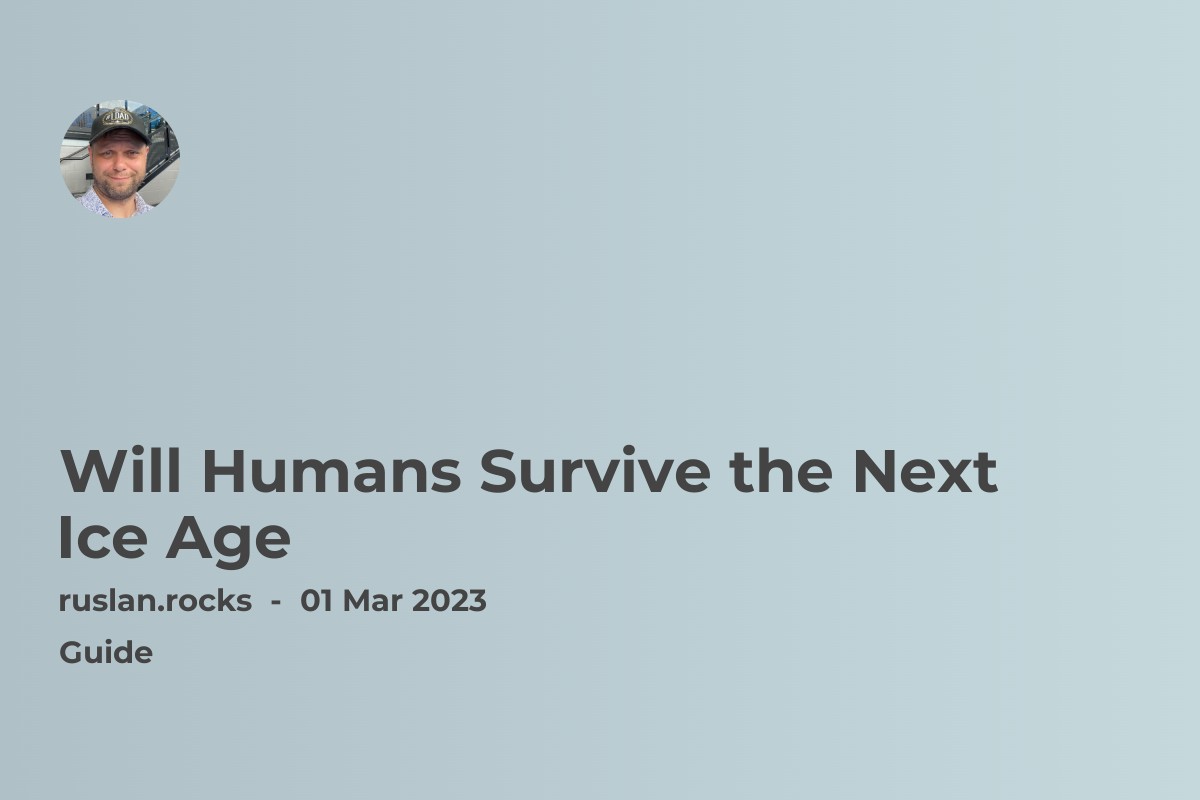- The Last Ice Age
- How Humans Survived the Last Ice Age
- Can Humans Survive the Next Ice Age?
- The Importance of Preparation
- What causes an Ice Age to end
- Conclusion
- Sources

The Earth's climate has been fluctuating for millions of years. From hot and dry to cold and icy, the planet has undergone numerous changes in its climate history. Scientists predict that the Earth is due for another ice age, but the question remains: will humans survive this extreme change in climate?
The Last Ice Age
The last ice age occurred approximately 12,000 years ago and lasted around 10,000 years. Much of the Earth was covered in ice during this time, and temperatures dropped significantly. However, humans survived this period due to their ability to adapt. They created tools and clothing to withstand the cold and learned to hunt and gather food in icy conditions.
How Humans Survived the Last Ice Age
The last ice age, also known as the Pleistocene, was a time of extreme weather conditions. The average temperature was around 12 degrees Celsius colder than today, and much of the Earth was ice-covered. Despite these harsh conditions, humans survived and even thrived during this period. One reason for this is their ability to adapt. They created tools and clothing to withstand the cold and learned to hunt and gather food in icy conditions. For example, they used spears for hunting woolly mammoths and other large animals and created warm clothing from animal hides. They also built shelters from bones, rocks, and ice to protect themselves from the elements.
Can Humans Survive the Next Ice Age?
While humans were able to survive the last ice age, the next one could prove to be much more challenging. The world's population has grown significantly since the last ice age, and many modern technologies rely on electricity and fossil fuels. In an ice age, these resources would be scarce, making it difficult to maintain our current way of life. However, advancements in technology and infrastructure may help us adapt to extreme conditions. For example, we could develop sustainable energy sources that can be used in cold environments. We could also build more resilient infrastructure to withstand extreme weather conditions, such as stronger buildings and roads.
The Importance of Preparation
Whether or not humans will survive the next ice age remains to be seen. However, it is important that we prepare for the possibility of such an event. This means investing in sustainable energy sources, improving infrastructure to withstand extreme weather conditions, and educating the public on survival in icy environments. These steps can increase our chances of surviving and thriving in future ice age:
-
Develop sustainable energy sources that can function in cold environments.
-
Design more resilient infrastructure that can withstand extreme weather conditions.
-
Educate the public on how to survive in icy environments.
-
Create cold-resistant crops that can thrive in the extreme conditions of an ice age.
-
Establish emergency preparedness plans for dealing with power outages and other challenges.
-
Develop new technologies for generating heat without electricity, such as wood-burning stoves.
-
Create underground or insulated living spaces that can retain heat.
-
Preserve the genetic diversity of plant and animal species to ensure their survival during an ice age.
-
Encourage population control measures to reduce strain on resources during an ice age.
-
Conduct research and testing on maintaining communication and transportation systems in icy conditions.
What causes an Ice Age to end
The Earth's climate has been much colder for most of the last million years, with ice sheets several kilometres thick covering large parts of North America and Eurasia. Every 100,000 years or so, the climate warms rapidly to conditions similar to today during intervals called "terminations." Scientists have long suspected that changes in the geometry of Earth's orbit are responsible for the coming and going of ice ages, with the two main candidates being the subtle increases in the tilt of the Earth's axis and the rotational changes that govern which part of the year that the Earth is closest to the Sun. In a recent study, an international team determined the age of two terminations that occurred about 960,000 and 875,000 years ago, suggesting that the initiation of both terminations is more consistent with increased summer energy from the Sun over the ice sheets, which is caused by an increase in the angle of Earth's tilt.
Conclusion
The next ice age is inevitable, but the fate of humanity is not. While it may be challenging, humans have the ability to adapt and overcome extreme changes in climate. By preparing for the possibility of an ice age, we can ensure the survival of our species and the continuation of our way of life. The key is to learn from the past and use our technological advancements to our advantage.
Sources
https://pursuit.unimelb.edu.au/articles/what-causes-an-ice-age-to-end
Ice Age Experts:
Garry Clarke, University of British Columbia
